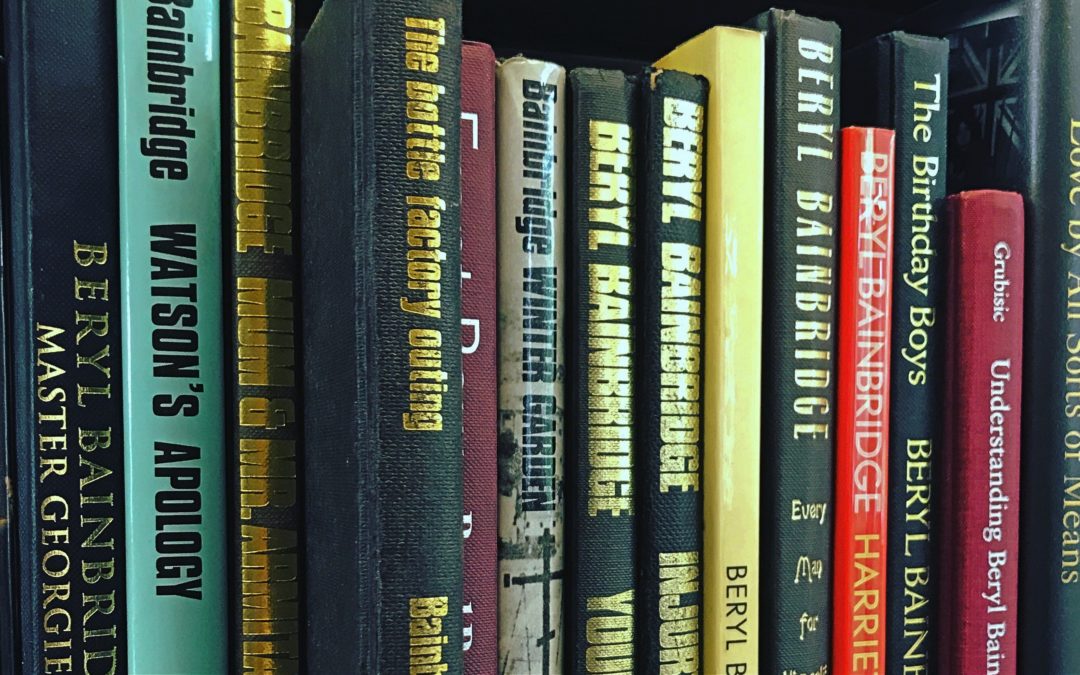Anne Welsh, PhD Candidate
This year’s London Rare Book School included for the first time a course on Using Publishers’ Archives, led by Dr Andrew Nash. We used ledgers and files at the British Library, University of Reading Special Collections and Senate House Library from a range of major publishers, including Macmillan, Mills & Boon and the Hogarth Press. At Senate House Library itself we dipped into the Duckworth Archive, and a class partner and I were given MS959B/box66/file12 to see what we could make of it.
Dating from 1974-5 it contains clippings of reviews for Beryl Bainbridge’s award-winning novel The Bottle Factory Outing. A document half-way through the file headed “BASIC REVIEW LIST” records the reviews under headings that are themselves revealing:
“Serious general dailies and weeklies” – 18 titles, including The Times, Daily Telegraph, Guardian and Financial Times, but also The Spectator, New Statesman, The Listener and The Tablet. 17 of these have reviewed Bainbridge’s book – the only one not to have done so was Punch.
“Provincials” – of the ten titles listed have reviewed the work, including The Scotsman, Glasgow Herald, Irish Press and Irish Times.
“Scientific periodicals” – unsurprisingly, since the book has no scientific themes, the three titles listed – Nature, The New Scientist and Science Journal have not reviewed it.
“Trade” – Books and Bookmen and British Book News, the two titles listed, both carried reviews of the work.
“BBC” – has only one entry, “Janet Newington,” who reviewed it.
Then, in ink at the bottom, someone at Duckworth has added an eclectic list of other titles and people – “Spare Rib, Sandra Gregory, New Review, Daily Mail, Daily Express, Daily Mirror, Robert Nye, Christopher Wordsworth, [and] Norman Shrapnel.” From this, we can deduce that The Bottle Factory Outing exceeded expectations, receiving coverage beyond the outlets Duckworth must have considered “usual” to include on their review list proforma.
This list must have been compiled quite early on in the book’s review life – the file also contains clippings from Germany and Canada, and lists of pull-quotes from both British and American sources, which they clearly intended to use in a continuing publicity drive.
What struck me the most going through the file was the change in the language used as the book progressed from new publication, to Booker Prize nomination, to winner of the Guardian Fiction Prize 1974, worth 200 guineas and, it transpires, more respectful treatment by most – though not all – reviewers. Early on, there are the usual sorts of brief notices, with plot summaries that try to draw the reader in without giving the too much away. As time passes, we see The Bottle Factory Outing in more article-length pieces, sometimes with photo accompaniments. By 31 October 1974, William Trevor is writing favourably of it in The Guardian, his final wish that “someone will have the sense to give her a prize somewhat undercut by the pull-quote from the review under Bainbridge’s author portrait, “Beryl Bainbridge: ‘…as though Muriel Spark had been prevailed upon to write an episode of The Liver Birds.”‘
Even after the prize was awarded at the end of November, there are still odd flurries of descriptors that we would not hope to see of novelists, irrespective of gender. “What makes a successful author?”asks The Northern Echo on 24 February 1975, which introduces Bainbridge as a “former actress and painter,” under a characteristically resigned and defiant photo of the author. The other writers, all male, look off into the middle distance in their headshots, while Bainbridge stares straight out at us, greeting us head on.
Because it was such a heavily reviewed novel, the file is fecund for research. Some of the pieces breathe the literary politics of the era, with women novelists carrying off many of the plaudits. The most unusual review is from the London Magazine April-May 1975 by Paul Bailey – a novelist himself far better known as a critic and for heading the infamous all-male “alternative judging panel” for the Orange Prize 2001. Discussing The Bottle Factory Outing alongside Muriel Spark’s The Abbess of Crewe, he sets his piece out in rather arch short story form “There was once a novelist called Muriel. She wrote several short books. Apart from the occasional comma and the necessary question-mark, she had little time for punctuation.” Later, he tells us “The novelist Beryl was often compared to Muriel. Perhaps it was her interest in the macabre. Certainly she shared Muriel’s misplaced affection for the comma.”
We learn nothing about the two novels, but rather a lot about Paul Bailey, who astonishingly must have been paid for this snide prose, and for whom it is therefore hard to feel sorry when he tells us, “The writer of this fable did not want to read “The Abbess of Crewe” and “The Bottle Factory Outing again” and that “While coping with Muriel and Beryl, he had the good fortune to encounter the work of Nadine. Her book ‘The Conservationist’…gave him back his faith in contemporary fiction. But someone else has written about that in this very issue, and a return to his own workshop is now the duty of Paul Bailey.”
In the 45 years since the publication of The Bottle Factory Outing, we might hope for better coverage of women writers, but although the language may have improved, the lastest VIDA Count (for 2017) found that major British literary titles still do not review women and non-binary authors (positively or negatively) as frequently as they do works by men – only 35.9% of reviews in the TLS and only 26.9% in the London Review of Books. Perhaps, rather than being shocked when men like Bailey form an alternative judging panel for the Orange Prize, or when we turn to the reviews section of our favourite journals, we should not naively expect too much to have changed. The compilers of the VIDA count, who work with this data regularly, “were not surprised to find that men dominate the pages of venues that are known to further one’s career.”
Perhaps, like Beryl Bainbridge, we should learn to cultivate that look of resignation and determination from her portrait in the Northern Echo till her death in 2010 – that look which in modern jargon we might sum up with the still-necessary phrase, “nevertheless, she persisted.” After all, whatever reviewers may have said or not said, it’s her novels that, thankfully, remain.
With thanks to Senate House Library Archives.


